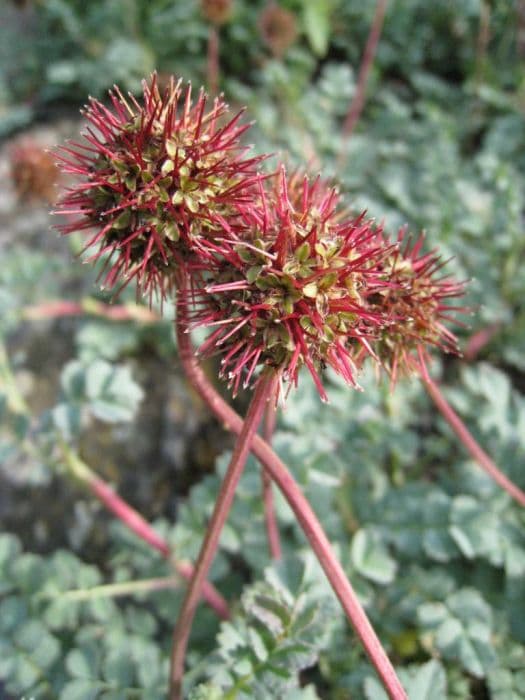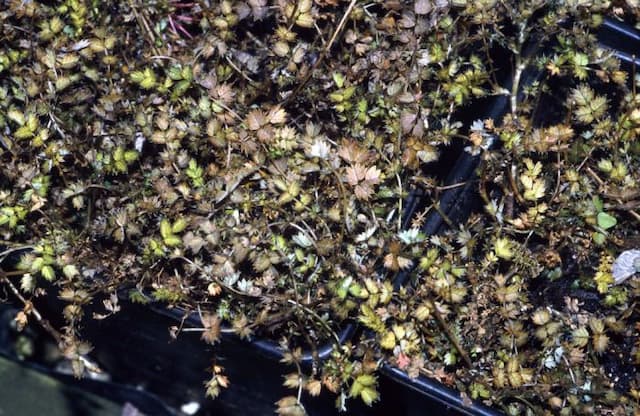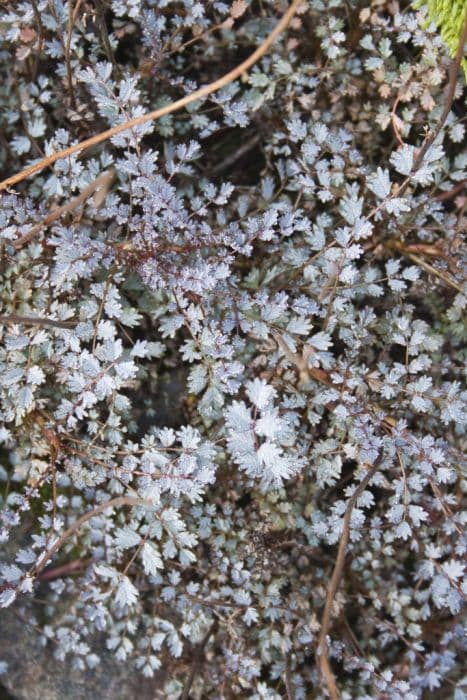Evelyn Rose Rosa Evelyn = 'Aussaucer' (S)
![rose [Evelyn]](/_next/image?url=https%3A%2F%2Fplants-admin.emdemapps.com%2Fimages%2Fplants%2F%2Fimages%2F604b5f3211118.png&w=3840&q=75)
ABOUT
Rosa Evelyn, commonly known as the Evelyn rose, is a captivating plant that boasts a stunning display of blooms. These flowers are characterized by a rich, apricot-pink hue that creates a warm and inviting visual spectacle. Each bloom is densely packed with numerous petals that form a classic, cupped shape - a hallmark of many visually appealing roses. These petals have a soft, velvety texture that further accentuates the luxurious appearance of the flowers. As the flowers age, they often exhibit a softer color, gently changing to a lighter tone, which adds to the nuanced beauty of the plant. The lush, green foliage that serves as a backdrop to the exquisite roses has a glossy finish, underscoring the health and vitality of the plant. Together, the vibrant blooms and verdant leaves create a delightful contrast that is pleasing to the eye. The Evelyn rose is also renowned for its delightful fragrance. Laden with a complex and enchanting scent, the air around the plant carries a mix of fruity and floral notes. This alluring aroma is capable of perfuming a garden space, making it a sensory pleasure not just visually but also olfactorily. In summary, the Evelyn rose presents a stunning aesthetic with its abundant, richly colored flowers, luscious petals, and gleaming green foliage, all contributing to its classic rose charm and sensory appeal.
About this plant
 Names
NamesFamily
Rosaceae
Synonyms
Evelyn Rose, David Austin's Evelyn Rose, Evelyn Climbing Rose
Common names
Rosa 'Aussaucer'.
 Toxicity
ToxicityTo humans
Roses, including the variety Rosa 'Aussaucer', are not considered toxic to humans. However, ingesting large quantities of rose plants, particularly the hips, may cause stomach discomfort. It's important to note that any non-edible plant material consumed in large amounts could potentially cause an upset stomach or an allergic reaction.
To pets
Roses, such as the Rosa 'Aussaucer', are generally recognized as non-toxic to pets. The ingestion of rose petals, leaves, or stems is not likely to cause serious harm. Nonetheless, it's possible that eating significant amounts of the plant could result in mild gastrointestinal upset in some pets, such as vomiting or diarrhea.
 Characteristics
CharacteristicsLife cycle
Perennials
Foliage type
Deciduous
Color of leaves
Green
Flower color
Apricot
Height
4 feet (1.2 meters)
Spread
3 feet (0.9 meters)
Plant type
Shrub
Hardiness zones
5
Native area
Cultivar
Benefits
 General Benefits
General Benefits- Ornamental Value: The Rosa 'Evelyn' adds aesthetic beauty to gardens with its large, apricot-pink flowers and attractive form.
- Fragrance: The flowers emit a delightful, fruity fragrance that can enhance the sensory appeal of any garden space.
- Landscape Uses: It can be used in mixed borders, cottage gardens, and rose gardens for structure and color.
- Pollinator Attraction: The blooms can attract bees and beneficial insects, promoting biodiversity.
- Cut Flowers: The roses are suitable for cutting and can be used in floral arrangements.
- Disease Resistance: The plant has been bred for improved resistance to common rose diseases like rust and black spot.
 Medical Properties
Medical PropertiesThis plant is not used for medical purposes.
 Air-purifying Qualities
Air-purifying QualitiesThis plant is not specifically known for air purifying qualities.
 Other Uses
Other Uses- Perfume Industry: The English Rose Evelyn's fragrance is particularly well-suited for use in perfumes, offering a classic rose aroma that is both rich and fruity.
- Bath and Body Products: The petals of the Evelyn rose can be infused in oils and used in hand-made soaps, bath bombs, and lotions for their fragrance and gentle astringent qualities.
- Edible Decorations: Evelyn roses can be crystallized with sugar and used to decorate desserts or embellish plates due to their attractive appearance and edible petals.
- Aromatherapy: Dried Evelyn rose petals can be used in potpourri or sachets to create a calming and relaxing atmosphere, contributing to stress relief and mental wellness.
- Natural Dye: The petals of the English Rose Evelyn, high in anthocyanins, can be used to create natural dyes for fabrics or in crafting, producing soft pink hues.
- Floral Arrangements: Evelyn roses are a popular choice for wedding bouquets and centerpieces because of their large, lush blooms and beautiful coloration that holds up well as cut flowers.
- Culinary Uses: Petals of the Evelyn rose can be used in syrups, jellies, or to flavor teas, offering a subtle floral taste that can enhance various dishes and beverages.
- Crafting: The sturdy stems and beautiful form of the Evelyn rose make it an excellent choice for creating wreaths and other flower-based craft projects.
- Garden Aesthetic: Planting Evelyn roses can add structure to a garden design, with their shrubby habit and recurrent blooming providing visual interest throughout the seasons.
- Photography: Due to their picturesque blooms, Evelyn roses are a favored subject for photographers specializing in plant and garden photography, capturing the essence of the English garden.
Interesting Facts
 Feng Shui
Feng ShuiThe rose is not commonly referenced specifically in Feng Shui practice.
 Zodiac Sign Compitability
Zodiac Sign CompitabilityThe rose is not used in astrology practice.
 Plant Symbolism
Plant Symbolism- Love: Roses are universally regarded as symbols of love and affection, often given to express deep romantic feelings.
- Beauty: With its elegant appearance, the rose symbolizes beauty, hinting at both inner and outer grace.
- Passion: The intensity of the rose's color and fragrance suggests deep passion and desire.
- Honor: In some contexts, roses, particularly when presented in a bouquet, can signify honor and admiration for someone's accomplishments.
- Devotion: Roses are often associated with a strong dedication or loyalty, given as a gesture to show one's deep commitment.
- Secrets: In historical times, roses were hung from the ceiling of a meeting room to demand that all present keep the discussed matters confidential, leading to the term 'sub rosa' or 'under the rose' to indicate secrecy.
- Mystery: The complex unfolding of a rose's petals can represent the unfolding of mysteries or the deep complexities of someone's personality.
- Spirituality and Purity: White roses, in particular, can symbolize spiritual love and purity, often used in various religious contexts.
- Grief: In some cultures, roses might also be used to express sorrow or grief during funerals or memorials.
 Water
WaterThe Evelyn Rose needs regular watering to maintain moist soil, especially during dry spells. In the growing season, water at least once a week with about 1 gallon per plant, ensuring a deep soak that reaches the roots. During hot or windy weather, increase watering frequency but avoid overhead watering to minimize leaf diseases. In winter, reduce water to when the soil is dry to the touch, about 1/2 gallon every two weeks, depending on climate and soil drainage.
 Light
LightThe Evelyn Rose thrives in full sunlight, requiring at least 6 hours of direct sun each day. The ideal spot is an open area with clear exposure to the sun throughout the day, without shade from trees or buildings. Morning sunlight is particularly beneficial as it helps to dry dew from the leaves, reducing the risk of fungal diseases.
 Temperature
TemperatureThe ideal temperature range for the Evelyn Rose is between 65 and 75 degrees Fahrenheit. They can survive minimum temperatures down to around 20 degrees Fahrenheit and maximum temperatures up to about 90 degrees Fahrenheit. Ensure proper mulching to protect roots in colder temperatures and provide some afternoon shade in extremely hot climates to prevent overheating.
 Pruning
PruningPrune the Evelyn Rose to encourage healthy growth, enhance air circulation, and shape the plant. The best time for major pruning is in early spring before new growth starts. Remove dead or diseased wood, and cut back about one-third of the previous year's growth. Thin out crowded branches, and prune to open the center of the plant to light and air. Deadheading spent blooms throughout the growing season will promote continuous flowering.
 Cleaning
CleaningAs needed
 Soil
SoilThe best soil mix for the English Rose 'Evelyn' should be rich in organic matter with good drainage. A blend of loamy soil, compost, and aged manure works well. The ideal soil pH for this rose is between 6.0 and 7.0, slightly acidic to neutral.
 Repotting
RepottingEnglish Roses like 'Evelyn' are typically not repotted often as they are grown in the ground. If grown in containers, they may only need repotting every two to three years, or when the plant outgrows its current pot.
 Humidity & Misting
Humidity & MistingEnglish Roses like 'Evelyn' do best in moderate humidity conditions. They don't require high humidity and will thrive when morning dew or a slight misting can provide enough ambient moisture.
 Suitable locations
Suitable locationsIndoor
Place 'Evelyn' English Rose in bright light and water regularly.
Outdoor
Plant 'Evelyn' English Rose in full sun, enriched soil, and mulch.
Hardiness zone
5-10 USDA
 Life cycle
Life cycleThe life cycle of the Evelyn rose, or 'Aussaucer', begins with seed germination, where the seed develops into a seedling given the right conditions of soil, temperature, and moisture. As it grows, the seedling develops into a young plant with leaves and stems, entering the vegetative stage where it focuses on growth. Upon reaching maturity, the Evelyn rose enters the flowering stage, where it produces buds that bloom into its characteristic large, fragrant flowers, typically in late spring to early summer. After pollination, often by insects attracted to its scent and color, the plant produces rose hips (fruit), containing seeds for the next generation. As the season progresses, the plant may enter a period of dormancy, especially in colder climates, where it conserves energy for the winter. With the return of favorable conditions in spring, the Evelyn rose resumes growth, completing its perennial cycle.
 Propogation
PropogationPropogation time
Spring-Early Summer
Propogation: The Rosa Evelyn 'Aussaucer' (S), commonly known as the English Rose, is typically propagated through a method called softwood cuttings. Propagation by softwood cuttings is usually done in late spring or early summer when the plant's new growth is still flexible but mature enough to root easily. This involves taking a cutting of about 5 to 6 inches (12.7 to 15.2 cm) from the healthy, non-flowering stems of the rose. The lower leaves are removed, and the cut end of the stem is dipped in rooting hormone to encourage root development. The cutting is then planted in a mix of peat and perlite or a well-draining potting mix and kept under high humidity and indirect light until roots have formed, which generally takes several weeks. Careful monitoring of moisture levels and the provision of gentle heat can enhance rooting success rates. Once the roots are established, the new rose plant can be transplanted into the garden or a larger pot for further growth.









